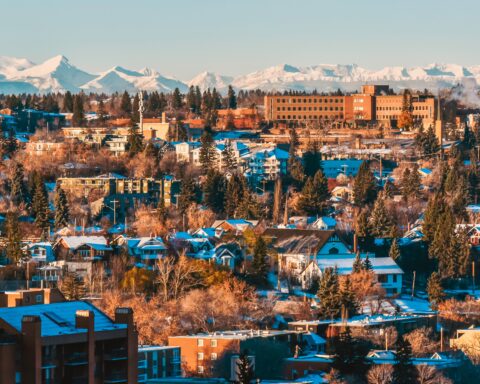The Saskatoon International Airport was a scene of exultation and relief on Sept. 17 when a family of seven Syrian refugees arrived to be reunited with their distant Canadian cousin.
Carlo Arslanian, a Syrian Canadian who left Syria when he was six months old, told CBC News that he was overjoyed to be able to provide his family members with refuge during the current crisis.
“I think it’s probably the best thing that’s ever happened to me and to my family,” said Arslanian. “They’re going to thrive in Saskatoon and in Canada. I hope it’s a well worth trip, and a well worth venture.”
“They’re going to thrive in Saskatoon and in Canada. I hope it’s a well worth trip, and a well worth venture.”
The Arslanians are just seven of over four million individuals who have fled Syria to neighbouring countries or western European nations since civil war broke out in the country in 2011. For most, this process can take months or even years to complete, with the time in between spent in refugee camps in Lebanon, Jordan, or Iraq.
A family of refugees who recently arrived in Charlottetown fled Syria over a year ago. They finally completed their journey on Sept. 25, when members of the local Syrian community received Awak Alkhalil and his family at the airport with welcome signs and flags.
“Thank you, thank you, thank you very much. Thank you Canada. Thank you government of Canada,” Alkhalil said.
Unlike the Arslanians, the Alkhalils did not have family members to sponsor their journey to Canada. Instead, Susan Nye-Brothers brought them to Charlottetown with the assistance of the Charlottetown Diocese Refugee Committee.
These families are just two of many who expect to reach Canadian shores this fall.
According to Refuge Winnipeg, an interfaith coalition of members from Winnipeg’s Islamic, Christian and Jewish communities, the group expects three Syrian families to arrive in their community within the next month. P.E.I. is also expecting two new families to arrive this month.
Expediting the process at home and abroad
In order to assist more families seeking refuge in Canada, the government is doubling the number of employees at the Winnipeg processing centre where all refugee applications are handled.
Beyond expanding their domestic services, the federal government is trying to boost these efforts even further by expediting the immigration of refugees to the country.
Immigration Minister Chris Alexander recently announced the government’s plans to bring 10,000 Syrian refugees into the country by September 2016 – 15 months sooner than its original pledge. The Conservatives have additional plans to resettle 10,000 more refugees over the next four years should they win the federal election this fall.
[I]mmigration officers are being instructed to assume that Syrians and Iraqis fleeing the region are indeed refugees.
Canada has resettled approximately 2,300 Syrian refugees since 2013 when it began efforts to assist those fleeing conflict in the region.
In order to speed up the application process for refugees, immigration officers are being instructed to assume that Syrians and Iraqis fleeing the region are indeed refugees, rather than require that they prove they are convention refugees as defined by the United Nations Refugee Agency.
This stipulation has previously led to lengthy application processes, which can stretch on for months, if not years, leaving individuals and families stranded in a perpetual limbo of refugee camps and bureaucratic processes.
Since the announcement, the Canada Border Services Agency (CBSA) has issued a call for employees who are ready for “rapid deployment” to the Middle East.
The department is working with Citizenship and Immigration Canada (CIC) to mobilize staff who have experience with refugee situations and who have knowledge of Arabic. Because of these requirements, the CIC is even asking retired immigration officers to step forward to assist in this time of crisis.
By sending officers to Lebanon, Jordan, and Turkey – countries where a majority of refugees have fled to in an attempt to escape conflict and eventually enter Western nations – both CIC and the CBSA hope to increase their presence on the ground and assist refugees before they even step foot on Canadian soil.
The larger conflict
What the Arslanians and the Alkhalils have in common is that their journeys began long before pictures of Alan Kurdi reached the Canadian public on Sept. 2.
The Middle East was rocked by a series of pro-democracy protests in early 2011 following the self-immolation of Mohammed Bouazizi, a street vender living in the coastal town of Ben Arous in Tunisia. Bouazizi’s death spurred protests in Sidi Bouzid that eventually spread to a large number of countries in the region.
In Syria, similar protests erupted after a group of teenagers were arrested and tortured for painting revolutionary slogans on a school wall.
What the Arslanians and the Alkhalils have in common is that their journeys began long before pictures of Alan Kurdi reached the Canadian public on Sept. 2.
The unrest eventually culminated in nationwide protests with hundreds of thousands of people taking to the streets to demand the resignation of President Bashar al-Assad.
The months that followed saw the country descend into devastating conflict with rebel forces facing off against government troops.
This is the Syria that Regina resident Hany Al Moliya left behind when he fled with his family in 2012.
A web series released on YouTube this week follows Al Moliya’s family’s struggles living in a small refugee camp in Lebanon. The family lived there for three years before finally arriving in Regina several months ago.
Al Moliya is one of the roughly 600 government-assisted Syrian refugees living in Canada. The others have all been brought to Canada through private sponsorship.
The challenge for Al Moliya – as well as for the Arslanians, the Alkhalils, and the many other families arriving in the country – is to now create a new life in Canada.
With the government’s newfound efforts to expedite the process of bringing Syrian and Iraqi refugees into Canada, Al Moliya will likely be joined by many of his fellow Syrians in the months and years to come.





